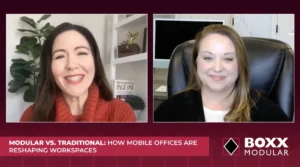How Glass Powers Collaborative Spaces, with Brittney Ricks of Clarus
This is Glass is in Session by Clarus, an AEC Podcast on MarketScale hosted by Daniel Litwin.
Collaborative technology is changing the work place, and has been for a while now. 61 million Gen Zers entered the workplace this year, and with them came a technological expectation, having grown up with interactive, responsive tech. However, the magic isn’t necessarily in the wires and software. Combine this with another work environment shift: the growth of co-working spaces, which are increasing at a rate of 16.1% annually. By 2022, employees who work in co-working spaces will have gone from 2017’s number of 1.7 million to 5 million.
This means that designing a traditional workplace means more tech, less walls and more flexibility. What employees are looking for in modern workplaces and in the tech that fuels them is something that inspires creativity and teamwork. Clarus, the largest glassboard manufacturer in America, knows this well. “They’re doing a lot of natural light studies and studies on where people are sitting within their space,” said Brittney Ricks, VP of Brand & Marketing. “They’re getting more visibility to collaboration, they’re encouraging their people and their employees to come together for ideas.” Ricks joins us on today’s episode to discuss how glass has made a comeback in the design of a work place, explaining how simplicity can sometimes foster more customization, creativity and aesthetic charm.
She gives more insight on the explosion of collaborative workspaces and what designers and business owners are searching for in their workplace tech. “You talk about technology becoming obsolete after a couple years, this is a product that’s not ‘smart,’ in fact the ‘smart’ is in the engineering.”
For the latest news, videos, and podcasts in the AEC Industry, be sure to subscribe to our industry publication.
Follow us on social media for the latest updates in B2B!
Twitter – @AECMKSL
Facebook – facebook.com/marketscale
LinkedIn – linkedin.com/company/marketscale









